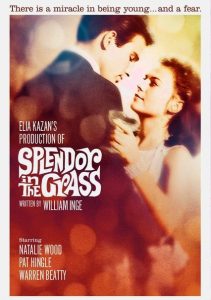Splendor in the Grass-1961
Director Elia Kazan
Starring Natalie Wood, Warren Beatty, Pat Hingle
Scott’s Review #1,231
Reviewed February 20, 2022
Grade: A-
Splendor in the Grass (1961) is mainly a film about teenage angst, but the angst spills over to the adults as pressures are heaved on many characters.
Fortunes are gained and lost following the Wall Street Crash of 1929, which handicapped some characters obsessed with money while the teenage characters battled emotions.
It offers poetic relics and references from English poet William Wordsworth about life and longing for love that can be thought about.
The film was written by William Inge, who also wrote 1955’s Picnic, and directed by Elia Kazan, famous for A Streetcar Named Desire (1951) and On The Waterfront (1954).
Splendor in the Grass is an uneasy watch but provides slices of the brilliance of those other films. Isn’t the point of a superior movie to make us think and ponder?
At the risk of feeling a tad dated some sixty years later, how powerful a film must have been in 1961, sending inevitable shock waves to audiences expecting a more wholesome show.
It’s also legendary Hollywood actor Warren Beatty’s debut, showcasing an emotionally superb performance by Natalie Wood.
Bud Stamper (Warren Beatty) and his high school sweetheart, Deanie Loomis (Natalie Wood), have an innocently blossoming relationship if only they could be left alone.
Their parents’ mutual oppressiveness weighs it down.
Bud’s father, Ace (a terrific Pat Hingle), is hell-bent on Bud attending Yale University in the fall. He is afraid Deanie will become pregnant, ruining the bright future he expects from the affluent young man.
Deanie’s mother (Audrey Christie) cautions her daughter from engaging in sexual relations and remaining a ‘good girl’ because she is frightened of Bud not marrying a girl with questionable morals.
Both parents’ meddling causes the teens emotional pressure and threatens to ruin their relationship and, perhaps, their futures. Bud’s mother is complacent, and Deanie’s father offers proper support to his daughter.
There is a lot of story going on in Splendor in the Grass, and all of it is juicy and relevant from the perspective of whoever the viewer takes. This is part of the beauty of the film- told through the eyes of Bud and Deanie and the fragile feelings teenagers possess, their parents can be dissected as well, and want the very best for their kids.
The romance is not just about Bud and Deanie. Other players and potential love interests are introduced, and we wonder if Bud and Deanie will ride off into the sunset together.
Inge and Kazan make us pose several questions. Do people who belong together make it? Do some people settle for different lives based on sacrifice? Can heartbreak lead to madness and a different perspective for some?
The terrific screenplay written by Inge is the film’s sweet spot. It’s complex and fraught with emotion and questions. The setting of remote Kansas in the late 1920s gave me a feeling of stifling predictability and one’s life already planned for them rather than encouragement to reach for the stars.
This is dangerous territory in itself.
Bud is expected to get an education but wants to live on a simple ranch and be a family man. Deanie is trained to be sweet and kind and to resist the pleasures of the flesh like her mother did, but is that enough for her?
Kazan, a master of brutal yet realistic films, brings excellent writing to life. Based on his other films, I knew I was not in for a cheery experience but rather a harsh reality. That sits well with me, as films that make one think are celebrated.
Splendor in the Grass (1961) resembles Rebel Without a Cause (1955) and stars Wood. The film teaches me that although generations come and go, the feelings and emotions young people feel in the moments when they are young never change.
Oscar Nominations: 1 win-Best Actress-Natalie Wood, Best Original Screenplay (won)
